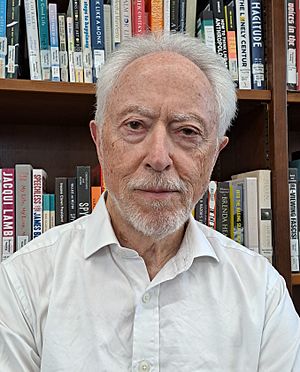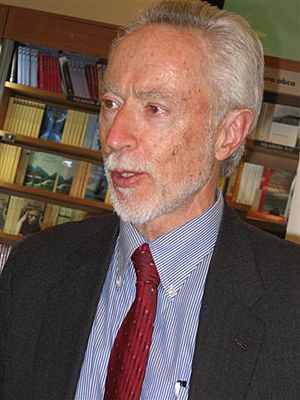J. M. Coetzee facts for kids
Quick facts for kids
J. M. Coetzee
AC FRSL OMG
|
|
|---|---|

Coetzee in 2023
|
|
| Born | John Maxwell Coetzee 9 February 1940 Cape Town, Union of South Africa |
| Occupation |
|
| Language | English, Afrikaans, Dutch |
| Nationality |
|
| Education | |
| Notable works | List |
John Maxwell Coetzee (born 9 February 1940) is a famous novelist, essayist, and translator from South Africa who later became an Australian citizen. He is considered one of the most important writers in the English language.
In 2003, Coetzee won the 2003 Nobel Prize in Literature, one of the highest honors a writer can receive. He has also won many other major awards, including the Booker Prize twice. His books are known for their powerful stories and deep ideas.
Coetzee moved to Australia in 2002 and became a citizen in 2006. He now lives in Adelaide, South Australia, where he is involved with the University of Adelaide.
Contents
Early Life and Schooling
John Maxwell Coetzee was born in Cape Town, South Africa, on February 9, 1940. His parents were Afrikaners, a group of South Africans descended from Dutch settlers. His father, Zacharias, worked for the government, and his mother, Vera, was a schoolteacher. The family spoke English at home, but Coetzee also spoke Afrikaans with his relatives.
His family history includes Dutch, German, and Polish ancestors. This background made him interested in Polish culture, which later inspired his 2022 novel, The Pole.
Coetzee spent his childhood in Cape Town and the town of Worcester. He wrote about this time in his book Boyhood. He went to a Catholic school in Cape Town and later studied mathematics and English at the University of Cape Town.
In 1962, he moved to the United Kingdom and worked as a computer programmer for companies like IBM. He wrote about his time in England in his book Youth.
A Career in Teaching
United States
In 1965, Coetzee moved to the United States to study at the University of Texas at Austin. He earned his PhD there in 1969. His final paper was a computer-based study of the writing style of author Samuel Beckett.
From 1968 to 1971, he taught English literature at the State University of New York at Buffalo. It was here that he started writing his first novel, Dusklands. During this time, he also took part in protests against the Vietnam War.
South Africa and Australia
In 1972, Coetzee returned to South Africa and became a professor at the University of Cape Town. He taught there for many years, eventually becoming a Distinguished Professor.
After moving to Adelaide, Australia, he became an honorary research fellow at the University of Adelaide. He continues to be involved with the university.
Writing Career
Coetzee's first novel, Dusklands, was published in 1974. Since then, he has written many novels, short stories, and essays. His writing often explores serious themes and features complex characters.
Some of his books are based on his own life, like Boyhood, Youth, and Summertime. In these books, he often writes about himself from a third-person point of view, as if he were another character.
In recent years, Coetzee has shown a great interest in the literature of South America, especially from Argentina. His trilogy of novels, The Childhood of Jesus, The Schooldays of Jesus, and The Death of Jesus, explore his ideas about language and storytelling.
Awards and Recognition

Coetzee has won many of the world's most important literary awards. However, he is known for being very private and often avoids award ceremonies.
The Booker Prize
Coetzee was the first author to win the prestigious Booker Prize twice. He won in 1983 for Life & Times of Michael K and again in 1999 for Disgrace. Several of his other novels have also been nominated for the prize.
The 2003 Nobel Prize in Literature
On October 2, 2003, it was announced that Coetzee had won the Nobel Prize in Literature. The Swedish Academy, which gives the prize, said that Coetzee "in innumerable guises portrays the surprising involvement of the outsider." This made him the fourth African writer to win the award.
Other Honors
Coetzee has won South Africa's top literary prize three times. He has also received awards from France, Ireland, and Israel. In 2005, the South African government gave him the Order of Mapungubwe, the country's highest honor, for his contributions to literature. On June 9, 2025, he was appointed a Companion of the Order of Australia (AC), a very high honor in Australia.
He is also the patron of the J. M. Coetzee Centre for Creative Practice at the University of Adelaide, which helps new and established writers.

Coetzee's Views
South Africa and Politics
During the time of apartheid in South Africa—a system of racial segregation—Coetzee was known for being against it. In a 1987 speech, he said that apartheid had damaged South African society and its literature. He called on the government to end the policy.
When he moved to Australia, he said he was attracted to the "free and generous spirit of the people."
Animal Rights
Coetzee is a strong supporter of animal rights and speaks out against cruelty to animals. He is a patron of Voiceless, an Australian animal protection group. In a 2007 speech, he criticized the modern meat industry. His novels, such as The Lives of Animals and Disgrace, also explore themes of how humans treat animals. Coetzee is a vegetarian.
He has also protested against the use of experiments on live animals for scientific research at universities.
Personal Life
Coetzee married Philippa Jubber in 1963, and they had two children, a son named Nicolas and a daughter named Gisela. The couple divorced in 1980. His son, Nicolas, died in an accident in 1989.
Coetzee is known for being a very private person who avoids publicity. He did not even go to London to collect his two Booker Prizes. His partner, Dorothy Driver, is also a professor at the University of Adelaide.
List of Major Novels
- Dusklands (1974)
- In the Heart of the Country (1977)
- Waiting for the Barbarians (1980)
- Life & Times of Michael K (1983)
- Foe (1986)
- Age of Iron (1990)
- The Master of Petersburg (1994)
- Disgrace (1999)
- Elizabeth Costello (2003)
- Slow Man (2005)
- Diary of a Bad Year (2007)
- The Childhood of Jesus (2013)
- The Schooldays of Jesus (2016)
- The Death of Jesus (2019)
- The Pole and Other Stories (2023)
See also
 In Spanish: J. M. Coetzee para niños
In Spanish: J. M. Coetzee para niños
- List of African writers
- List of animal rights advocates
- List of vegetarians

